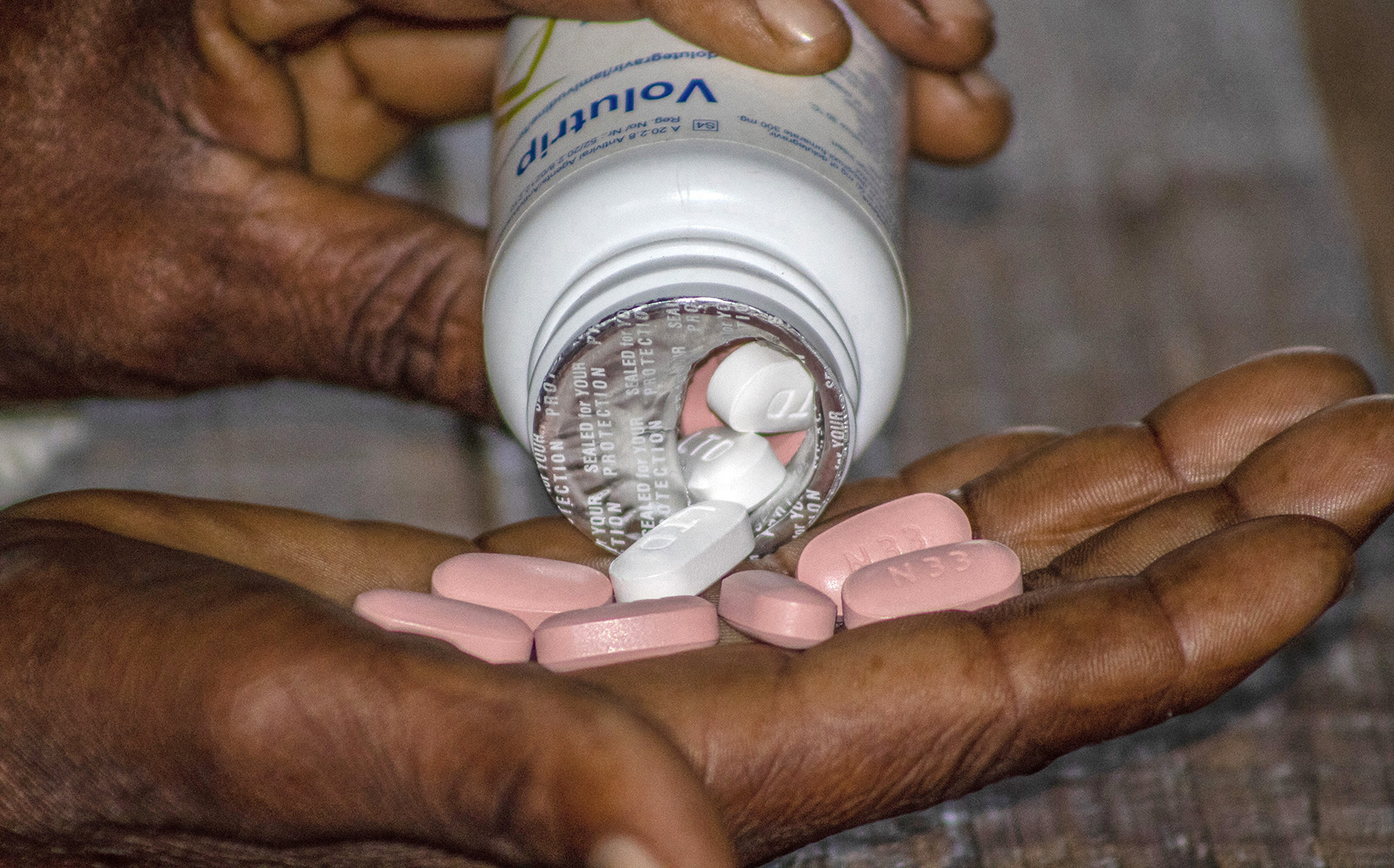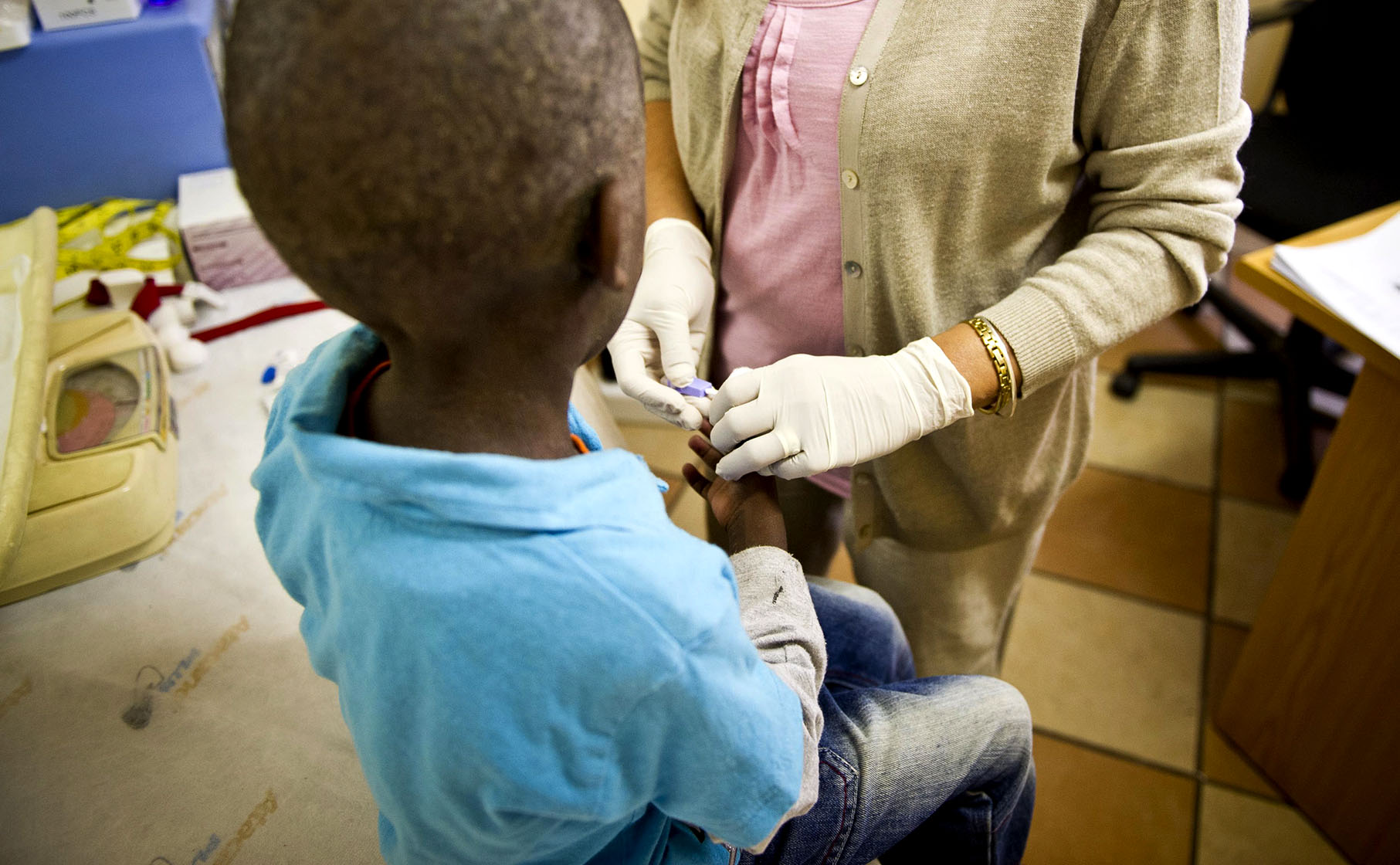In just a few short weeks, thousands of South African health workers in HIV/Aids programmes funded by the United States Agency for International Development (USAid) have had their lives and careers upended.
USAid issued notices to Pepfar-funded HIV organisations terminating their funding for good on Wednesday, 26 February. This came just over a month after US President Donald Trump’s executive order freezing almost all foreign development assistance pending a review.
Debbie (a pseudonym given to a source who chose to remain anonymous) is an employee at a Pepfar-funded organisation who lost her job due to the USAid cuts. She told Daily Maverick she was stuck at home, unable to return to her clinical work and struggling to find paid opportunities in a public health system plagued by austerity.
“How do I spend my days? Panicking and feeling completely lost, because my career has been pulled out from under me in a very unexpected way,” she said.
 Patients at a Right To Care HIV/Aids clinic in Johannesburg. (Photo: Gallo Images / Foto24 / Cornel van Heerden)
Patients at a Right To Care HIV/Aids clinic in Johannesburg. (Photo: Gallo Images / Foto24 / Cornel van Heerden)
“I’ve been reaching out to all of my connections at facility, district, province and national level, asking if there’s any possibility of me getting a post, and there’s just been the same echo across every single level of the system, saying that they’re under fiscal austerity, there’s a moratorium on posts, and there is no opportunity for me or any of my colleagues to be absorbed into the Department of Health at the moment.”
In an effort to continue helping patients in any way she can, Debbie is seeking an unpaid volunteer position at a large Gauteng hospital. However, she’s not yet sure whether her request will be approved.
“My organisation has given me permission to volunteer, because I do this high-risk care with pregnant women, and they haven’t had that input for the last six weeks,” said Debbie.
“I just need to get back to work. This is my passion and I do it well, and I know that there are women out there who would benefit from sitting and talking to me… I can’t volunteer long term. I have a family, a home, everything else to sustain, but in the short term, the needs of the patients override my needs whilst the dust settles.”
The mental health of workers who lost jobs due to the USAid cuts is suffering, said Debbie. She was particularly worried about former employees who were in lower-income roles or financially insecure households.
“With a 30% unemployment rate in the country, it’s not as though you’re just going to step into another job,” she said.
Read more: ‘The axe has fallen’ — Trump’s USAid issues notices to terminate funding for key health programmes across SA
USAid terminations
Trump’s administration has stated that USAid made a final decision to cancel nearly 5,800 awards worldwide, while retaining more than 500, according to a Reuters report. The cut also affected health programmes that were supported by USAid funding from sources other than Pepfar.
Pepfar (the US President’s Emergency Plan for Aids Relief), a global health programme started in 2003, provided South Africa with about $440-million in funding for the US financial year spanning October 2024 to September 2025. It constituted 17% of South Africa’s R44.4-billion campaign for HIV counselling and testing, according to Health Minister Dr Aaron Motsoaledi.
Pepfar funds are distributed to South African implementing partners by USAid and the Centers for Disease Control and Prevention. About half of the Pepfar-supported programmes in SA receive funding through USAid.
It is not yet clear exactly how much funding has been cut by USAid, and how many organisations and workers were affected. However, health activists say they have yet to hear of any South African USAid-funded health programme that did not have its funding terminated.
“For us, we had to retrench 1,300 lay counsellors – they’re the people who are doing that care and support work – and we lost 700 data capturers. They’re the ones who notice when people don’t come back [for treatment],” said Debbie.
 South Africa’s HIV testing programme has been a huge success. (Photo: Rodrigo Nunes / MS / Spotlight)
South Africa’s HIV testing programme has been a huge success. (Photo: Rodrigo Nunes / MS / Spotlight)
On Wednesday, the Treatment Action Campaign (TAC) and Ritshidze released a statement detailing how the withdrawal of Pepfar funding threatened to interrupt their life-saving work. Ritshidze is a community-led monitoring system that was established in 2018 to gather data on dysfunction in clinics and how it affected access to healthcare.
According to the TAC, Ritshidze has collected data from more than 450 clinics every quarter, resulting in shorter waiting times at health facilities and a significant increase in people getting a 3-month supply of antiretrovirals (ARVs).
As a result of the USAid cuts, Ritshidze has lost its main funding source, placing the programme’s future at risk. It is in the process of retrenching hundreds of staff members.
Sibongile Tshabalala, TAC’s national chairperson, said that the withdrawal of Pepfar-supported NGOs from clinics has led to the departure of 15,154 staff with “years of institutional knowledge”.
“The immediate impact is waiting times getting longer, people living with HIV going home with just one- or two-month’s worth of pills, and some people being turned away from clinics because they don’t have a transfer letter after the drop-in centre or mobile services they were using had shut down.
“The crisis in our clinics is only going to get worse, and many more people might stop treatment,” Tshabalala said.
TAC general secretary Anele Yawa said that the organisation had been forced to take “drastic measures” to avoid shutting down altogether, including retrenchment processes and redesigning its structures.
“We will try to merge the TAC and Ritzhidze structures so that we can keep monitoring a smaller group of clinics… but the reality is that we don’t have enough money for this yet. Just as the situation is worsening in our clinics, our ability to monitor and expose the challenges has been cut,” he said.
Worsening HIV epidemic
The consequences of the USAid funding cut for South Africa’s HIV/Aids sector are wide-ranging and potentially devastating. Professor Glenda Gray, a South African physician, scientist and activist specialising in the care of children and HIV medicine, said that many USAid-funded programmes focused on key populations and districts that had the highest burden of HIV.
“By removing resources in those areas and impacting on the ability to diagnose the most vulnerable people and put them into treatment, it will impact the HIV epidemic going forward,” she said.
Even though the South African government purchases the majority of the country’s antiretroviral drugs itself, the USAid cuts could still affect the supply chains for these medications.
Gray said, “USAid supported the logistics, the forecasting, the supply. There’s a whole team, after you buy the drugs, that has to… take drugs from the places where they’re stored into the clinics.
 Antiretroviral HIV medication. (Photo: Hoseya Jubase)
Antiretroviral HIV medication. (Photo: Hoseya Jubase)
“Supply chain management and drug delivery management is a sophisticated thing. So, yeah, we can buy drugs, but can we get them through the system? Will there be stock-outs? Will the drugs get where they have to go in a timely way?”
Dr Babalwa Maholwana, an independent strategist with more than 15 years in HIV prevention, said that the most recent research had indicated that the widespread defunding of HIV/Aids programmes could result in more than 500,000 preventable deaths over the next decade. This is because the Pepfar-funded programmes helped bridge the gap in access to treatment, testing and awareness for key populations, which government programmes struggled to service.
Maholwana referred to the prevention of mother to child transmission (PMCT) programmes run at healthcare facilities and clinics across the country, which had been affected by the USAid cuts. These programmes have been instrumental in protecting babies from contracting HIV by ensuring the viral loads of mothers remain low through antiretroviral therapy (ART).
“As soon as you’ve got any interruption of treatment, and that includes treatment programmes themselves, it increases the possibility of babies contracting HIV from their mothers,” she said.
While everyone is susceptible to HIV/AIDs, those living in impoverished communities are more likely to feel the burden of the funding cuts due to social vulnerability, said Maholwana.
“When we talk about strengthening the healthcare system, we also have to talk about how we make the system more robust and resilient. We need to build a self-sustaining system because we cannot always rely on aid to make up for our infrastructure gaps, as evidenced by the crisis we currently find ourselves in,” Maholwana said.
Read more: Health Department green-lights longer supply of antiretroviral medicine amid US aid freeze
Read more: Pressure mounts on Health Minister Motsoaledi to remedy ‘catastrophic consequences’ of US aid freeze
Department of Health
In a media release issued on Monday, 3 March, the National Department of Health said that it was embarking on a “consultative process” with organisations affected by the decision of the US government to freeze and cut donor funding for HIV/Aids and TB response programmes.
“The process was initiated by the department in order to receive first-hand information to understand the extent of impact of funding cuts in order to make informed decisions on the proper interventions by government,” the department said.
“The department values the contribution made by these organisations in the country’s response to HIV/Aids and TB, hence we remain committed to work with them to develop short-medium to long-term interventions.”
The department said that it had communicated with provinces to make necessary preparations and adjustments to accommodate new patients in the treatment programmes, “in accordance with relevant standard operating guidelines”.
This was likely to have been a reference to an emergency circular issued by the health department’s director-general, Dr Sandile Buthelezi, on 11 February, detailing the measures that formed part of the “contingency plan” to respond to the temporary suspension of support from Pepfar and its implementing partners.
However, health activists have noted that while the circular was an important first step, there was a need for emergency funding allocations to sustain service delivery. With Finance Minister Enoch Godongwana’s 2025 Budget speech delayed until 12 March, there remains a lack of clarity about budgeting across provincial health systems for the coming financial year. DM




 Antiretroviral HIV medication. (Photo: Hoseya Jubase)
Antiretroviral HIV medication. (Photo: Hoseya Jubase)